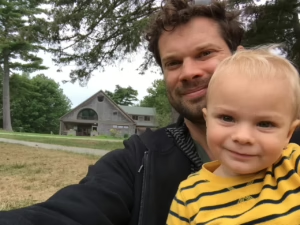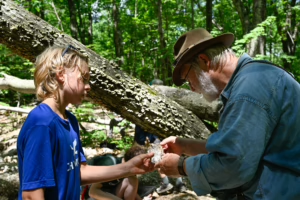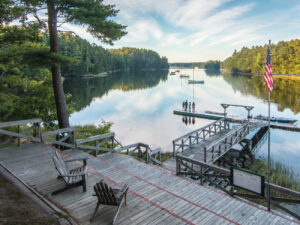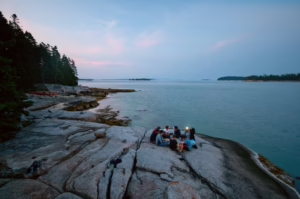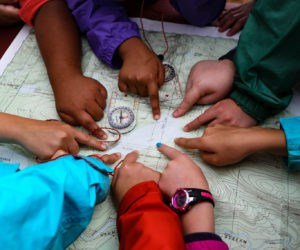On Wednesday, 43 high school juniors from California, Connecticut, Massachusetts, Minnesota, New Jersey, New York, North Carolina, Rhode Island, and Texas arrived at Chewonki with a rush of fresh energy. Fielding questions from students and parents was Maine Coast Semester Head Susan Feibelman, in her element. She and her faculty had been thinking and talking about Semester 60 students for weeks. Now she was meeting them. “It’s a wonderful moment, after so much anticipation,” she said, beaming.
Feibelman knows Maine Coast Semester opening day from both sides. She and her husband, George Turner, did it twice as parents: once for their daughter, Eva (Semester 23), and a second time for their son, Zeke (Semester 31). So she understands parents’ nerves. She can reassure them because she’s seen how the semester experience has played out in her children’s lives.
“When Eva and Zeke were semester students, standing at the edge of 16 or 17 years old,” she remembers, “I watched them gain a deeper sense of comfort with who they were becoming in the world. Whether that meant building relationships, exploring uncharted territory, or creating positive change, they found their own true north.” Feibelman, beginning her second semester as head, hopes Semester 60 parents will have the same pleasure.

Eva Feibelman Turner is now, like her mother, an educator. She teaches U.S. history at the American Hebrew Academy in Greensboro, North Carolina. After Maine Coast Semester, she went to Mount Holyoke College and then earned a master’s in history from Northeastern University. She has visited Chewonki twice with her family since her mother became head. Being back stirred memories.
“I was struck by the feeling of Chewonki: the feeling of community, how you can be simultaneously rooted in one small place but also in how that place reaches out into the larger world,” she says. “I hadn’t been back to the Neck since my brother was a semester student, yet after all that time and despite the things that have changed, Chewonki still felt the same.”

Motherhood gives her a new vantage point. “I loved seeing Chewonki through my three-year-old son Isaac’s eyes,” she says. “We visited the chickens, counted canoes, inspected all of the rocks and twigs around campus. He immediately fell in love with the farm and, more specifically, [workhorse] Sal…I love that he is growing to know a place that is so deeply part of who I am.”
Zeke Turner lives in Berlin and is a reporter for the Wall Street Journal. He wrote for and edited the campus newspaper while at Dartmouth College, where he was a classics major. A scholarship in Germany took him abroad and he’s been there ever since, first freelancing for Businessweek, the New York Times, the New Yorker, and other publications before working for Politico and, for the past three years, the Journal.
He returned to Chewonki in Janauary and says, “A huge flood of memories came back. Definitely remembered chores–like weeding the flower beds in front of the Wallace with [English teacher] Amy Rogers, using kickboards to keep our knees off the stones, or mopping the Hilton with [English teacher] Paul Arthur. The chores where you just got to spend time and talk with your classmates and teachers were my favorite.”

Like his sister, Turner found revisiting the farm evocative. “I wrote my college essay about shoveling compost,” he says. “I remember watching a calf being born and butchering chickens, harvesting basil, eating a carrot directly out of the ground.”
For him, Maine Coast Semester was an opening. “I think the freedom to be independent and experiment with different ideas about myself was really powerful,” he explains. “I’ve built my life abroad and out in the world. I think that began at Chewonki, even though it seems like a very protected, isolated place. It was the first time I had to live, work, play, do everything with people outside of my normal world.”
Intellectual engagement was also a hallmark of his experience here. “There was a certain intensity about the program,” he recalls. “The classes were hard. Teachers like [U.S. history teacher] Scott Andrews told you if you made a mistake or you weren’t thinking clearly enough. Everyone held you accountable. It just raised the bar in a way that I loved.”
As Susan Feibelman welcomed her bright-eyed new students, her own memories, her own children, allowed her to say “I am glad you are here” to students and “We’ll take good care of them” to parents–and mean it with all her heart.




